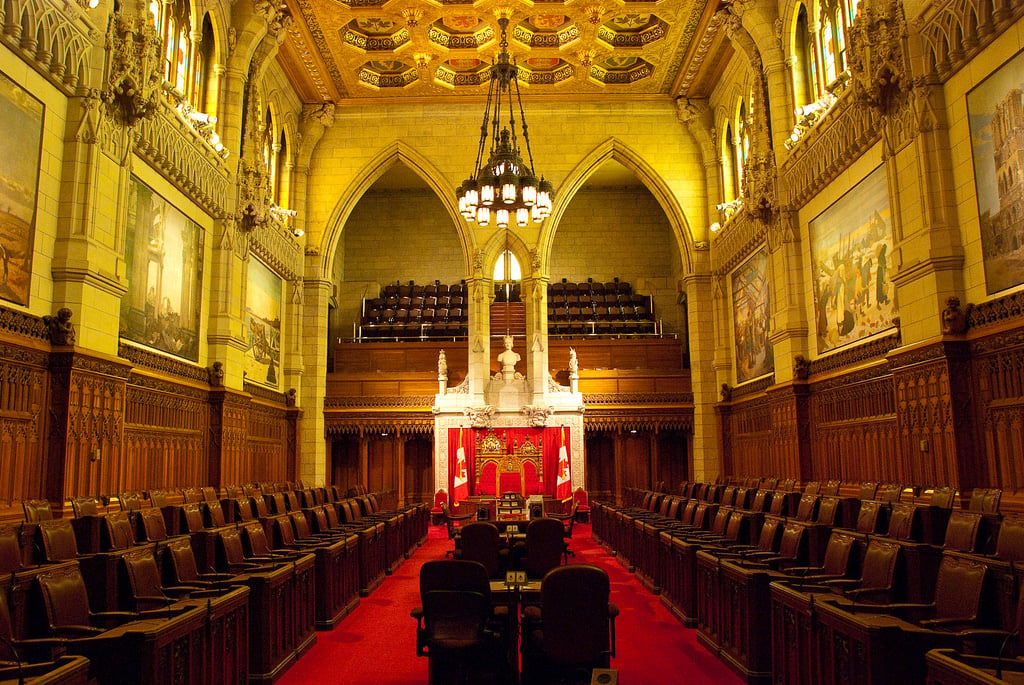Back when Canada was founded, prime minister John A. Macdonald did his best to ensure that — some — minority rights were safeguarded.
“We must protect the rights of minorities, and the rich are always fewer in number than the poor,” Macdonald is said to have declared in 1864 during a meeting to plan rules for the new country’s Senate.
And Canada’s first politicians ensured that the riffraff would be kept out of the Senate.
Only people who owned land worth at least $4,000 in the province they were to represent could be appointed to the new country’s Senate, the colonial politicians decided. And prospective senators had to have at least $4,000 in net worth. That’s the equivalent of about $100,000 today.
The Senate was seen as a necessary institution to guard against the “democratic impulses” of an elected Parliament, said University of Toronto political science professor Nelson Wiseman. “To do that, they wanted people who were established.”
The rules determining those eligible to vote to elect MPs — set by individual provinces for 10 of Canada’s first 13 elections — also shut out the less affluent, women and minorities. Voter eligibility rules based on property ownership and income levels continued into the 20th century. Most women won the right to vote in 1919; Chinese-Canadians in 1947; First Nations in 1960.
But the Senate was to be strictly for the establishment, which was seen as less likely to pander to populism, Wiseman said.
But more than 150 years later, a senator from Nunavut is working to change the law.
Conservative Dennis Patterson has introduced legislation to abolish the rules on landownership and net worth for prospective senators. If it passes in the Senate, the House of Commons would look at the proposal.
Patterson isn’t the first to try to change the law. Former senator Tommy Banks of Alberta tried three times, Patterson said, but each time the bill died on the order paper.
Patterson said the rules are outdated.
“It reflects an era when the landed gentry were the only ones considered privileged or fit to govern,” Patterson said. “I think moving forward with a change of this kind is timely, it’s called for.”
A 2014 Supreme Court of Canada decision paved the way for the change.
The court rejected most of former prime minister Stephen Harper’s attempts to revamp the Senate without provincial approval.
But the ruling said the federal government could change the land ownership and asset requirements.
Patterson’s bill would change the requirements in all provinces except Quebec, where provincial legislation requires senators to own land in the specific region of the province they represent. The Quebec legislature would need to change that law to remove the requirements.
Patterson said the current rule means about 80 per cent of people in the territory he represents aren’t eligible for a Senate seat because they don’t own land.
“Who would ever say that 80 per cent of residents of Nunavut should be excluded from the get-go from applying to be appointed?”
The rules are “elitist, out-of-date” and “from the feudal era,” he said.
Patterson added many on-reserve Indigenous people are not eligible because they don’t have title to the land on which they live.
The Liberal government has announced Senate reforms, like creating an advisory board to help ensure senators are appointed based on merit rather than political connections.
But it doesn’t plan to introduce measures eliminating the property requirement, said a spokesperson for Minister of Democratic Institutions Maryam Monsef.
Instead, the Liberals will “study and debate” Patterson’s bill in the house, they said.
Debate on Patterson’s bill in the Senate has offered insight into how some senators became landowners to qualify.
Some senators buy tiny tracts of land to meet the $4,000 threshold, sometimes having to “scramble around” to get it, said Patterson.
Sen. Peggy Butts was a nun and didn’t own land due to a poverty vow. She eventually gained ownership through her congregation so she could serve. (Butts is the aunt of Gerald Butts, one of Prime Minister Justin Trudeau’s top advisors.)
In a debate on Patterson’s bill in March, Sen. Larry Smith said he paid $7,000 for his “property,” arguing a retiring senator down from his $10,000 asking price.
And Sen. Ghislain Maltais suggested that since some senators had bought land just to be eligible, the government should buy it from them if the rules are changed.
“Since we have a constitutional requirement to be landowners, if we were to remove that condition, the Crown would have to step up, buy the land and write us a cheque,” Maltais said. “It’s as simple as that.”
Without that condition, Maltais said, he would not support the bill.
Sen. Joan Fraser said the land that she uses to meet the rules has no real value. “In my own case, I suspect that all I could possibly do is donate my land to some kind of institute for the study of wetlands,” she said.
Patterson said he thinks the bill will ultimately pass because most senators he has spoken to support it.
“I’m also optimistic that a new government that’s committed to changing and modernizing the Senate will look favourably on this change,” he said. ![]()
Read more: Federal Politics
















Tyee Commenting Guidelines
Comments that violate guidelines risk being deleted, and violations may result in a temporary or permanent user ban. Maintain the spirit of good conversation to stay in the discussion.
*Please note The Tyee is not a forum for spreading misinformation about COVID-19, denying its existence or minimizing its risk to public health.
Do:
Do not: